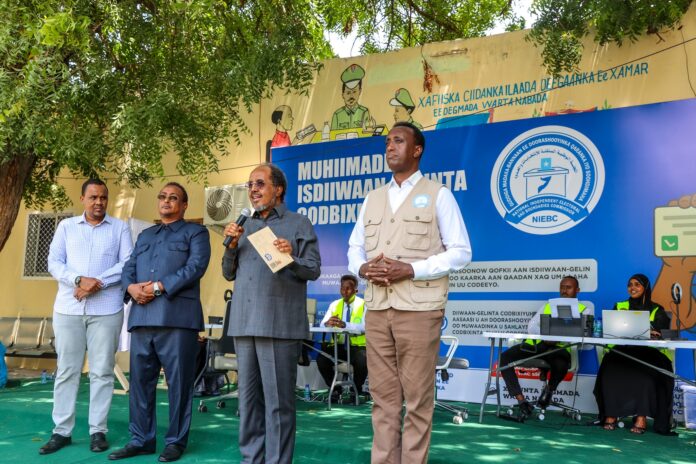President Hassan Sheikh Mohamud’s proposal to adopt one-man-one-vote elections in Somalia confuses politicians on the waiting list for Somalia’s leadership.
This article weights what went wrong, the current situation, and a less dangerous way out, plus the president’s achievements. The article also analysis the President’s tactics to lead the country by hook and crook.
President’s promises
Due to Mohamud’s experience as a term president (not continuously) and his promise to fulfil his unfinished tasks during his first term, namely fight against Al-Shabab, corruption, and woeful unemployment in the country, the exhausted and desperate nation of Somalia put its faith in him and expected abrupt changes.
President Mohamud launched a many-sided war against Al-Shabab by mobilizing clans to fight side-by-side with the government, visiting battlefields frequently, and inspiring his government members to follow his footsteps and show solidarity for the military and clan militia in the war.
The President also started a campaign against corruption with countless public litigation. This campaign later faced widespread criticism, as much of the litigation allegedly appeared to be politically motivated, prompting many people to flee the country.
What went wrong?
Contrary to what Mohamud promised to the nation, his attempt to uproot al-Shabab failed, corruption is getting out of hand, unemployment is at its peak, and a worrisome political division has emerged.
Security challenges and setbacks
Despite Mohamud’s promise to uproot al-Shabab and the war he waged against them, security deteriorated, the government lost crucial territories to al-Shabab, Macaawisley fighters were disheartened and disappointed after the government’s commitment wobbled. This led the entire campaign into disarray , although the President has not despaired but has shown willingness to maintain the offense against al-Shabab.
Elections- Challenges and prospects, constitutional review
Incontestably, the popular clannish 4.5 electoral systems cannot be permanent and never serve democracy. Thus, someone at the highest Office should try to change, and President Mohamud knowingly took the thorny path and assigned himself to be the champion and took the risk to change this notorious system.
Mohamed vowed to hold the first one-man-one-vote elections in the country since 1969 by shifting from clan-based indirect voting through constitutional review process.
Thus, the unsolved dispute between the Federal Government and its Member states on electoral laws pushed by the president and passed by the lower and Upper Houses hurts Somalia’s crucial and fragile electoral legitimacy and exacerbates existing political fragmentation. The president started to review Somalia’s contested constitution, signalling a possible extension of his tenure in the name of conducting one-person-one-vote elections across the country. Many voiced against this project by questioning Mohamud’s power and tenure to fulfil these core issues and warned the two-term president’s aspiration to extend his term by passing a self-orchestrated electoral law, which was later blessed by the upper and lower houses.
This also degraded the vital role of Somalia’s National Consultative Council, which comprises the Five States of Somalia, Benadir Region, and the federal Government. The president distanced himself politically from two federal states, Jubbaland and Puntland.
Despite the clear negative impact, the president continued constitutional revision without wider consultations with political stakeholders and federal state leaders, and persuaded either by payment or loyalty, lawmakers to vote for his project. Subsequently, the President established an electoral commission, which started swift voter registration in Mogadishu. In this case, Prof. Mohamud upset his political foes and friends.
The President’s friends’ and foes’ reaction
Mohamud’s political comrades, opposition leaders, and analysts were bewildered by his sudden move to conduct a one-man-one-vote vote in Somalia, where his administration barely controls a portion of the country’s territory. At this time and in this situation, it is highly improbable, if not completely impossible, to witness during Mohamud’s current tenure free and fair elections across the country.
Current political stalemate situation
In general, President Mohamud’s political move caused wide uproar in Somalia’s political arena, where former leaders and the so-called political stakeholders meet and compete for the country’s leadership through indirect/selected/elected parliamentary and presidential positions, and a corrupt electoral system. Opposition leaders suggest that something sinister will occur if the President mismanages elections, tries to extend his term, or refuses to leave the barber’s chair and pass the turn to the next one.
Practise what you preach, Somalia leaders’ dirty policy
President Mohamud vociferously opposed Farmaajo’s attempt to extend his term, and now he is following in Farmaajo’s footsteps. This move puts in question what exactly is wrong with Somali leaders, as they are not practising what they are preaching. Once again, Somalia is in an uncertain situation with no clear way out as the incumbent president forgets to leave the barber’s chair and give way for the next one or run for another term.
Analysts’ words on the country’s topsy-turvy situation, a pragmatic approach to the president’s leadership
Previously, before joining politics, President Mohamud served in Somalia as an educator, peace and reconciliation activist, and he is considered one of the founding fathers of non-governmental higher education institutions after Somalia’s Military government collapsed.
“President Mohamud made a deliberate constitutional review in a way that I see self-serving electoral legislation, which his administration allegedly prepared and passed the rulebook for the coming game (elections), selected the referees, and played the game.” Abdirahman Hassan, Political analyst in Somalia.
“This reflects Mohamud’s former job as a teacher, whose basic task was to prepare the exam, correct the exam, and decide the points scored by students.” Abdirahman continues.
Way outs and the President’s preparation for the upcoming elections
Is it wise, rational, and imperative that Mohamud backpedal on his one-man-one-vote promise and go once again to Halane Tent? It is clear that the president understands that the only way in this complicated electoral system is going back once again to a selection/election based indirect election (aka Teendhada), which was and apparently is a solution in the current situation, but far away from fairness, not to mention democracy. In this system, corrupted politicians seek power and money gained through pilferage.
If closely examined, the President’s ongoing preparations and campaign-like movements, opposition leaders are at a Mexican standoff, scattered and knocked down.
President Hassan Sheikh Mohamud is adopting a complex political strategy to consolidate his power and uphold control over Somalia’s upcoming and disputed elections. He is creating several backup alternatives to outfox his political adversaries.
His core strategy is to promote a one-person, one-vote election model. However, many see this as a tactical interruption, expecting that opposition groups will rebuff the model. If they do, the President has a contingency plan: reverting to a system where traditional leaders select lawmakers at the will of federal state leaders.
The President’s pressure on Federal Member States
Jubbaland: The federal government is backing a parallel administration in Garbaharey to weaken the authority of Jubbaland leader Ahmed Madobe, whose relationship with the Federal Government was worsening day in and day out.
Puntland: The establishment of the NES (Northeastern State) administration in Lasanod has seriously debilitated Puntland’s influence in this crucial area, effectively removing its representation from the Sool, Sanaag, and Cayn regions. This division lets the Federal Government fill the next parliament with supporters, giving President Mohamud substantial power over the forthcoming government.
Subterfuge of Consultation
At the same time, the President presents an image of inclusivity by inviting opposition leaders to consultative meetings at Villa Somalia. While this shows a readiness to engage with the international community, many analysts see these meetings as ceremonial. Opposition leaders often leave these meetings muddled by the President’s vague statements and disarmed by his hospitality, rendering them politically ineffective. As long as this cycle continues, President Mohamud’s electoral strategy is likely to succeed.
Jeopardy of Escalation
There is a potential risk that if opposition leaders in Mogadishu tire of these fruitless discussions on election models, the capital may experience turmoil similar to the uprisings during former President Farmajo’s term. That very same revolt was led by President Mohamud himself.
Somalia – Somaliland
President Mohamud’s return to Villa Somalia in some way signalled a calm, amicable, and peaceful engagement with Somaliland and Djibouti leaders. President Gelle of Djibouti tried to mediate between President Bihi, then Somaliland President, and President Mohamud of Somalia, but failed. Somaliland moved toward elections, and the outcome of that election sent once again a signal of hope, due to the diplomatic experience of the elected Somaliland President, Abdirahman Irro, but nothing positive happened.
Somaliland- The Geopolitical Dimension
Mr. Irro, at his leisure, plays a low profile but functioning diplomatic role in the Horn of Africa issues by persuading international leaders to recognize Somaliland as an independent state in exchange for its strategic sites in and at the sea.
While the world order is ever changing, Somaliland finds itself in a position of strategic advantage. Its geographic location has attracted the attention of world powers, particularly the United States, which is considering it as an alternative to its military base in Djibouti, where it operates in proximity to an expanding Chinese military presence.
Many ifs and buts are in the President’s current political movements
President Mohamud holds a PhD in peace and reconciliation and has notable experience in the fields of education and politics. So for sure, Mohamud can save the country from the uncertain situation and more fragmentation by seeking a safe, shortcut, and inclusive option to take on board all available political stakeholders.
Unanswered questions on the carpet are countless, but one question is almost in the mind of every Somali: Can former lecturer and Somalia’s current leader, Mohamud save the fragile electoral system of the country, unify the nation and create at least glimpse of hope toward a democratic nation free from the notorious 4.5 based power-sharing?
Author of this article
The author is chief editor of Finnish-Somali media network, media trainer and peace advocate and. He writes about peace and conflict solution in Horn of Africa. He can be reached via email: abdimusem@yahoo.com
Note: The Article can be freely reproduced, published and distributed by mentioning the source.







